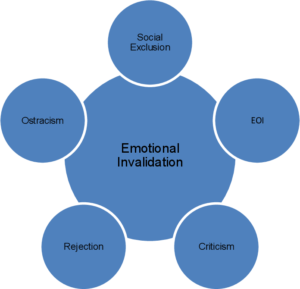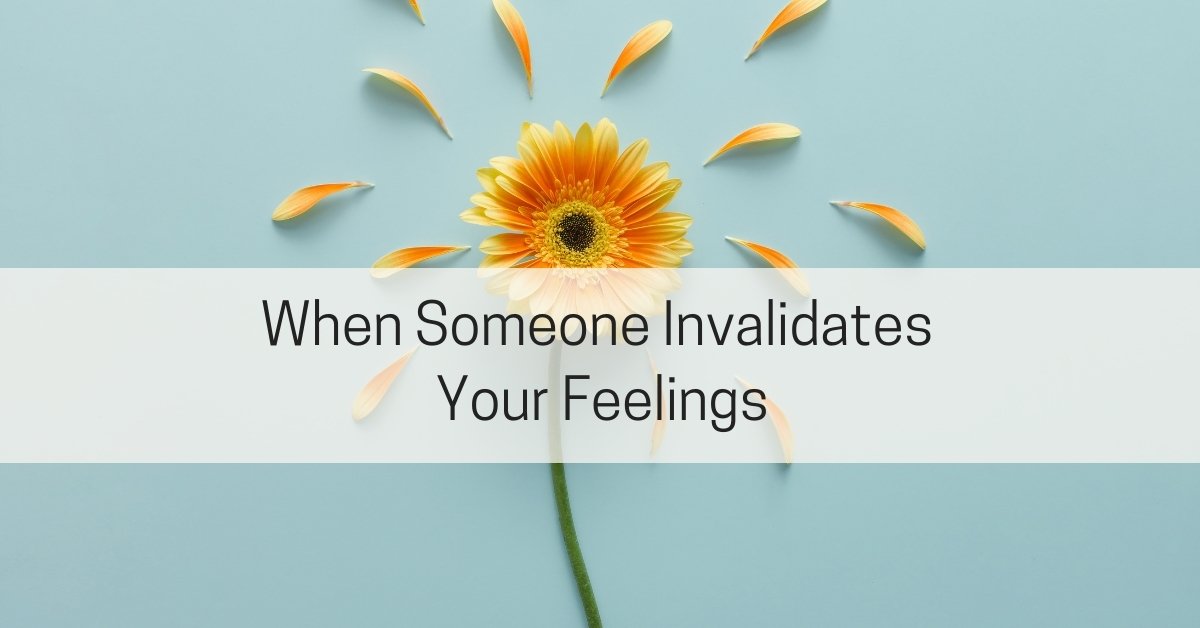Emotional Invalidation is a powerful form of emotional abuse. It can rob you of your self-confidence. This makes it difficult to trust your own perceptions and feelings and keeps you in unhealthy relationships. This blog post will explore the different ways invalidation happens, how it impacts people’s lives, and what they can do about it.
Contents
What Is Emotional Invalidation?
 Emotional Invalidation is a form of emotional abuse. It is where someone is repeatedly made to feel that their feelings are wrong or invalid. Anyone can easily do this through words, deeds, or a combination of the two. This is a very common form of abuse. It can even leave the person feeling helpless, alone, and unworthy. It can also lead to self-loathing, depression, and PTSD.
Emotional Invalidation is a form of emotional abuse. It is where someone is repeatedly made to feel that their feelings are wrong or invalid. Anyone can easily do this through words, deeds, or a combination of the two. This is a very common form of abuse. It can even leave the person feeling helpless, alone, and unworthy. It can also lead to self-loathing, depression, and PTSD.
Emotional Invalidation is different than simple disagreement with another person’s feelings or experiences. For example, if someone said they felt invisible in a room full of people you would not be invalidating their feeling by disagreeing because it is “obviously not true” that everyone noticed them. However, if the same person said they were sad when their favorite team lost an important game you might tell them they are wrong for being upset – after all – “it was just a game!” This would be emotionally invalidating since there really isn’t any logical reason to feel sadness over something like this happening.
The term emotional invalidation is often used interchangeably with “gaslighting”. This can be true because this form of abuse typically involves the abuser making their victim feel crazy or mentally unstable. This is by denying, discounting, or downplaying a person’s feelings and experiences over a period of time.
Signs of Emotional Invalidation

Here are some signs of emotional invalidation:
- You often second-guess yourself when in an argument with another person. They convince you your thoughts/beliefs were incorrect.
- Others tell you your feelings about something that isn’t logical. This is when in reality there isn’t any logic behind feeling differently than what they say is correct
- You have an opinion only for it to be ignored completely by others. They are who then jump into explaining why you’re wrong without even giving your point a chance to properly defend itself.
- You feel like you have to be extra careful when speaking up for yourself around certain people because they invalidate your feelings/opinions
- People make faces or give you negative nonverbal cues when you express an opinion that differs from theirs even if it is not said in a rude way.
- You feel like you can never do or say anything right
- You constantly doubt your own feelings and experiences
- Your emotions are dismissed as unimportant or irrational
- You find yourself apologizing for things that aren’t your fault
- People tell you how to feel or what to think about your own life
- You’re often told that you’re too sensitive or dramatic.
- You feel like you can’t trust your own judgment
- You feel like you’re constantly walking on eggshells around someone
- Someone is always making fun of or mocking your feelings
- People regularly tell you that you’re being too emotional
- You feel like you can’t express yourself around certain people
- People may tell you that your feelings are “inappropriate” or don’t make sense
- You feel like no one will listen to what you have to say.
Reasons For Emotional Invalidation
There are many reasons why someone might emotionally invalidate another person. Some of the most common reasons are:
Insecurity
 This can be a major reason for invalidating someone else’s feelings. People who are insecure may feel the need to make themselves look more important or better than others by belittling them and their thoughts/opinions in an effort to boost their own confidence.
This can be a major reason for invalidating someone else’s feelings. People who are insecure may feel the need to make themselves look more important or better than others by belittling them and their thoughts/opinions in an effort to boost their own confidence.
Ego
 People with large egos often have a hard time seeing outside of themselves which can lead them to believe that anyone who thinks differently must be wrong, even if they know very little about what is being discussed. This form of emotional invalidation usually happens when people try too hard to impress another person, like bragging about how amazing they are (when it isn’t true) just so someone will like them instead of trying to find common ground for conversation where everyone feels respected without having one person feel the need to elevate themselves over another.
People with large egos often have a hard time seeing outside of themselves which can lead them to believe that anyone who thinks differently must be wrong, even if they know very little about what is being discussed. This form of emotional invalidation usually happens when people try too hard to impress another person, like bragging about how amazing they are (when it isn’t true) just so someone will like them instead of trying to find common ground for conversation where everyone feels respected without having one person feel the need to elevate themselves over another.
Inability To Empathize
 When someone can’t empathize with others, it’s often because they have a hard time understanding what people are going through or feeling which leads them to invalidate those feelings as not being important or worth getting upset about. Some may even go so far as telling their victim that whatever is making them sad isn’t actually happening and/or didn’t happen in an effort to keep from having empathy for that person.
When someone can’t empathize with others, it’s often because they have a hard time understanding what people are going through or feeling which leads them to invalidate those feelings as not being important or worth getting upset about. Some may even go so far as telling their victim that whatever is making them sad isn’t actually happening and/or didn’t happen in an effort to keep from having empathy for that person.
Closed Mindedness
 This form of emotional invalidation usually happens when a group of friends all shares a common belief system but one member believes differently than everyone else does on some level (even if only slightly). In these situations, the person who doesn’t share the same beliefs is often ridiculed and made to feel like an outcast which can lead to a great deal of emotional invalidation.
This form of emotional invalidation usually happens when a group of friends all shares a common belief system but one member believes differently than everyone else does on some level (even if only slightly). In these situations, the person who doesn’t share the same beliefs is often ridiculed and made to feel like an outcast which can lead to a great deal of emotional invalidation.
Jealousy/Envy
 When someone is feeling extremely jealous or envious of another person, they may start to look for any flaws they can find in that person as a way to make themselves feel better. This usually results in tearing down the other person by invalidating their feelings and opinions about anything and everything.
When someone is feeling extremely jealous or envious of another person, they may start to look for any flaws they can find in that person as a way to make themselves feel better. This usually results in tearing down the other person by invalidating their feelings and opinions about anything and everything.
Control
This is another reason why someone might invalidate the feelings of others. When people are insecure, they may use emotional invalidation as a way to try and control or manipulate their victim into thinking/feeling/doing what they want them to in an effort to make themselves feel better even if it means putting down someone else in order to do so.
Boredom
 This can be a big reason why someone emotionally invalidates another person. People who are bored may try to find entertainment by teasing or harassing others which often leads to them making fun of other people’s feelings as well as their life in general (like the clothes they wear, how they look, etc.).
This can be a big reason why someone emotionally invalidates another person. People who are bored may try to find entertainment by teasing or harassing others which often leads to them making fun of other people’s feelings as well as their life in general (like the clothes they wear, how they look, etc.).
Positive Effects of Emotional Invalidation

There can be many positive effects of emotionally invalidating someone else. Some of those are:
Beneficial To Abuser
When someone tries very hard to emotionally invalidate another person (like trying too hard to impress), it may be because of their own insecurity which leads them to feel threatened by this other person who seems more confident/proud of themselves even though nothing spectacular has happened at all. In these types of situations, emotional invalidation can cause both people involved in this dynamic to feel better about themselves while pushing the one who appears stronger away from them instead of accepting help or support from them.
Beneficial To Victim
There can be many benefits for the person who is on the receiving end of emotional invalidation. Some benefits are:
Makes Them Stronger
When someone has been emotionally invalidated for a long time, it can make them stronger in the sense that they learn how to deal with difficult situations and emotions by themselves. This usually happens as a result of being ignored or ridiculed every time they try to express themselves which eventually leads to them shutting down and stopping trying altogether.
Teaches Them To Deal With Rejection
If someone is always invalidated by others, it will likely lead to them feeling rejected most of the time. However, this isn’t always a bad thing because it teaches people how to cope with rejection and not take it personally when it happens.
Decreases Need For Validation
If someone is constantly invalidated by others, they will eventually stop needing validation from them which can help them feel more secure and confident in themselves/their decisions without the need for anyone else’s approval or support. This often causes people who are on the receiving end of emotional invalidation to rely less on other people while becoming better at standing up for what they believe in (instead of following everyone else like a lost puppy).
Reduces Desire To Be Around Someone
People who find themselves emotionally invalidated over and over again may become tired of dealing with this kind of treatment and decide that enough is enough – meaning that their desire to be around this person decreases significantly. This can also lead to the victim cutting off all communication with this person altogether and may even result in them ending the relationship if it’s a romantic one.
Negative Effects of Emotional Invalidation

There are many negative effects of emotionally invalidating someone else. Some of those include:
Cause Victim To Become Vulnerable
When people are constantly put down, it can make them feel vulnerable and afraid which may lead them to start seeking out attention from other sources or even worse – place themselves in abusive or neglectful situations where they believe that at least one person will accept and love them for who they truly are (and not what others want them to be). This is a very serious concern as emotional invalidation often leads victims into dangerous circumstances without their knowledge.
Leads Victim Into Overanalyzing Everything
When someone feels like everything about who they are isn’t good enough, this type of treatment by others only causes them to overanalyze everything they do which results in their feelings of insecurity and low self-esteem getting worse instead of improving.
Makes More Vulnerable To Mental Illness
When people are constantly invalidated, it can prevent them from feeling like there’s anyone out there who understands or accepts them for who they truly are inside. This type can lead victims to become more vulnerable to developing mental illnesses such as anxiety disorders and depression because the lack of support and understanding from others only makes things seem much worse than what is really happening on the surface level. It also leads victims into shutting down emotionally so that nothing else seems real anymore (which explains why some people may choose not to speak up when something upsetting happens).
Causes Victim to Feel Unsupported
When someone faces emotional invalidation, they may feel as though no one truly cares about them or what happens in their lives. If this continues for a long period of time, it can cause victims to feel that no one supports them. It is even for people who are very close to them. This often leads to distancing themselves from these loved ones. This is so that they don’t have to deal with being emotionally hurt anymore. It is because the rejection only seems like it’s coming from those who support or care for them.
How To Deal With Emotional Invalidation?

There can be many ways to deal with emotional invalidation. Some of those include:
Understanding That It’s Not About You
One of the most important things that you can do for yourself if this is happening more often than not, is realizing that it has nothing to do with who you are as a person and everything about what they’re going through in their life at the moment which leads them into acting out towards others the way that they currently are.
Avoiding Becoming Engulfed In Their Emotions
It can be difficult to not take things personally. This is when someone is constantly invalidating your emotions. But it’s important to remember that doing so will only give them more power over you. Try distancing yourself emotionally from the situation as much as possible. You should remind yourself that their words and actions are a result of them and not you.
Speaking Up About How It Makes You Feel
If confronting this person directly seems like too daunting of a task, try writing down how their behavior makes you feel in a letter. You can even write an e-mail and send this to them. This way they’ll be able to see everything that they’re doing wrong from your perspective. They may even start to change their ways after realizing how their actions are affecting you.
Avoiding Becoming Defensive
You can’t control what others do or say to you, but you can always choose how to react and respond. If someone is constantly invalidating your emotions, it may be a good idea for you to avoid being so defensive. This is when they try pointing out something about yourself that’s not ‘perfect’. Even if their ultimate goal is trying to bring you down as much as possible in order to feel self-important themselves. This doesn’t mean that every single thing they tell you isn’t true. The more time goes on, the easier it will become for them to see these things about themselves too.
Seeking Professional Help
If the emotional invalidation is too much for you to handle on your own, seek professional help. This can be a great way to get the support that you need. A therapist will be able to provide you with different coping mechanisms. He/she can advise on how to deal with this type of situation. This is so that it doesn’t continue to affect your life in a negative way.
Conclusion
Emotional invalidation is when someone’s emotions or experiences are dismissed, ignored, or downplayed by others. This type of treatment can make victims feel vulnerable and afraid. This may lead them into dangerous situations without their knowledge. When there is constant emotional invalidation, it can prevent them from feeling like there’s anyone out there who understands or accepts them for who they truly are inside.
If you are looking for affordable Online Counseling MantraCare can help: Book a trial therapy session


